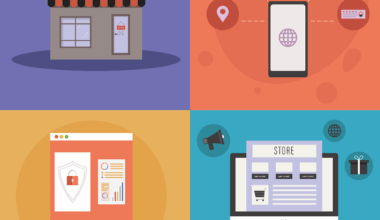The Benefits of Cloud-Based Retail Marketing Tools
Cloud-based retail marketing tools have become essential in the contemporary retail landscape. These tools integrate various marketing functions and utilize advanced technologies that enhance efficiency. One significant advantage is scalability; retail businesses can easily adjust the tools to their needs without extensive and costly installations. Users can access them from anywhere, allowing teams to collaborate effectively across various geographical locations. Additionally, cloud solutions tend to offer better data security measures, ensuring that customer information and proprietary business data are protected from breaches. When businesses adopt cloud solutions, they often experience reduced operational costs; this is primarily due to lower infrastructure expenses. Furthermore, cloud-based tools can streamline data management and analytics processes. Businesses gain insights into customer preferences and behavior, which enable them to devise targeted campaigns for better results. Integration with other platforms like CRM systems enhances these tools’ functionality. Retailers can track campaigns, measure their effectiveness, and quickly adapt strategies in real-time. Another notable benefit is that updates and upgrades are seamless, keeping businesses on the cutting edge. In conclusion, adopting cloud-based retail marketing tools provides strategic advantages that retailers can’t overlook.
Cloud-based retail marketing tools also promote enhanced customer engagement through tailored communication. Businesses can utilize these tools to segment their audiences efficiently, delivering personalized messages to customers based on preferences and purchasing history. By adopting advanced algorithms, retailers can analyze massive volumes of customer data to create a shopping experience that meets those individual needs. This level of personalization often leads to improved customer satisfaction and loyalty. Additionally, these tools facilitate feedback mechanisms, allowing retailers to respond quickly to customer inquiries and concerns. Engaging customers through social media becomes more manageable with integrated cloud tools. Through automated campaigns and curated content, businesses can maintain a consistent brand presence while reducing manual work. Moreover, these marketing tools provide a centralized platform for managing various channels, including email, social media, and in-app notifications. It ensures that messaging is coherent and aligned across platforms, reinforcing brand identity. Integration with analytics helps in tracking engagement metrics, allowing retailers to adjust their strategies dynamically. As a result, high engagement rates can boost conversion and retention scores. The adaptability and efficiency of cloud-based solutions undoubtedly empower retailers to not only engage but also truly connect with their customers.
Another significant benefit of cloud-based retail marketing tools is real-time analytics. Retailers can gather, analyze, and interpret data instantly without any delay. This timely access to metrics empowers businesses to make quick decisions regarding their marketing strategies. For example, if a specific campaign under-performs, marketers can alter creative elements or messaging promptly to better resonate with their audience. The insights derived from real-time data enable retailers to understand market trends and consumer behavior shifts, leading to more informed strategic planning. Furthermore, cloud tools come equipped with robust reporting capabilities, allowing for the generation of detailed reports with ease. Retailers can compare data across different periods, channels, or campaigns, providing a comprehensive view of marketing performance. This level of insight fosters accountability, enabling teams to assess what works and what doesn’t. By understanding which initiatives yield the best ROI, businesses can allocate resources more efficiently. The capacity for predictive analytics also exists, preparing retailers for future trends and consumer demands. Overall, the integration of real-time analytics in cloud-based tools transforms how retailers approach marketing, offering a strategic advantage over traditional methods.
Cost-Effectiveness of Cloud Solutions
Organizations looking to maximize their marketing budgets often find cloud-based retail marketing tools to be a cost-effective solution. By eliminating the need for hefty upfront costs related to hardware and software, businesses can save valuable resources. Subscription-based pricing models provide flexibility, allowing retailers to pay only for the services they use. Such models also permit affordable tiered access, where smaller retailers can start with basic features and scale up as their needs grow. Over time, this flexibility translates into significant savings, especially for small and medium-sized enterprises that have tighter budgets. Additionally, cloud solutions often come with minimal maintenance requirements. Service providers handle updates and technical issues, allowing retail staff to focus on core business operations. Furthermore, by employing cloud tools, retailers can leverage data from various sources without having to invest in expensive in-house analytics infrastructure. This democratization of data access empowers teams across various departments to make data-driven decisions. Therefore, retail businesses are more equipped to experiment and innovate their marketing efforts, fostering an agile marketing environment that drives growth. Consequently, the cost savings and efficiency improvements enable retailers to invest further in reaching their customers.
Collaboration among teams is significantly improved with cloud-based retail marketing tools, fostering a more integrated working environment. With cloud solutions, team members can work together in real-time, eliminating the silos often present in traditional marketing setups. This collaborative approach allows for the sharing of insights and ideas seamlessly, enabling diverse teams to contribute to marketing initiatives. Enhanced communication features, such as shared dashboards and comment threads, allow stakeholders to provide instant feedback. Retail marketing teams can brainstorm and develop strategies more effectively, leading to more innovative and creative campaigns. Furthermore, project management functionalities embedded within these tools ensure that all team members are aligned with timelines and goals. Task assignments and progress tracking foster accountability, facilitating smooth campaign execution. As cloud-based tools promote greater visibility into ongoing projects, all parties can quickly adjust to any challenges that arise. The adaptability within a collaborative environment ensures that marketing efforts are coherent and in sync. This integration ultimately results in more unified messaging for customers and prospects alike. Therefore, retailers utilizing these tools can leverage collective expertise, leading to campaigns that are well-rounded and impactful.
Improved Customer Insight and Responsiveness
Enhanced customer insight is another notable advantage that cloud-based retail marketing tools can provide. Through in-depth customer data analysis, retailers gain a more profound understanding of their target audience. With robust analytics capabilities, businesses can track customer interactions across various channels and platforms. This level of detail allows for a comprehensive view of customer preferences and behaviors. Consequently, retailers can tailor their marketing efforts to align closely with customer needs. The real-time capability also means that businesses can swiftly respond to changing customer sentiments and preferences. If a particular product garners negative feedback, retailers can take immediate corrective action, whether it be adjusting marketing strategies or enhancing customer service efforts. Furthermore, the integration of machine learning algorithms can predict future consumer behavior patterns based on past interactions. Such predictive capabilities provide retailers with insightful foresight that aids in strategic planning and targeted marketing. The overall improvement in the responsiveness to customer insights ultimately enhances the customer experience. Therefore, retailers can drive loyalty and trust by demonstrating that they value customer feedback and are willing to make necessary adjustments.
To summarize, cloud-based retail marketing tools offer myriad benefits that empower retailers in today’s competitive marketplace. From enhanced customer engagement to improved real-time analytics, these solutions foster more effective marketing strategies that are adaptable to changing consumer trends. The cost-effectiveness of cloud tools allows retailers of all sizes to maximize their marketing budgets, freeing resources for other critical investments. By facilitating collaboration among teams, cloud tools create a holistic working environment that sparks innovative marketing campaigns. Improved customer insight gained through data analysis enables retailers to craft more personalized experiences for their customers. As these businesses become more responsive, they enhance customer satisfaction and loyalty. Moreover, seamless updates and integrations mean retailers are always equipped with the latest features. Ultimately, cloud-based retail marketing tools can transform traditional marketing approaches into agile, data-driven strategies that drive success. Retailers looking to grow and stay competitive in a massive market should seriously consider implementing cloud solutions. As consumer demands evolve, having the right tools is essential for delivering successful marketing initiatives.








